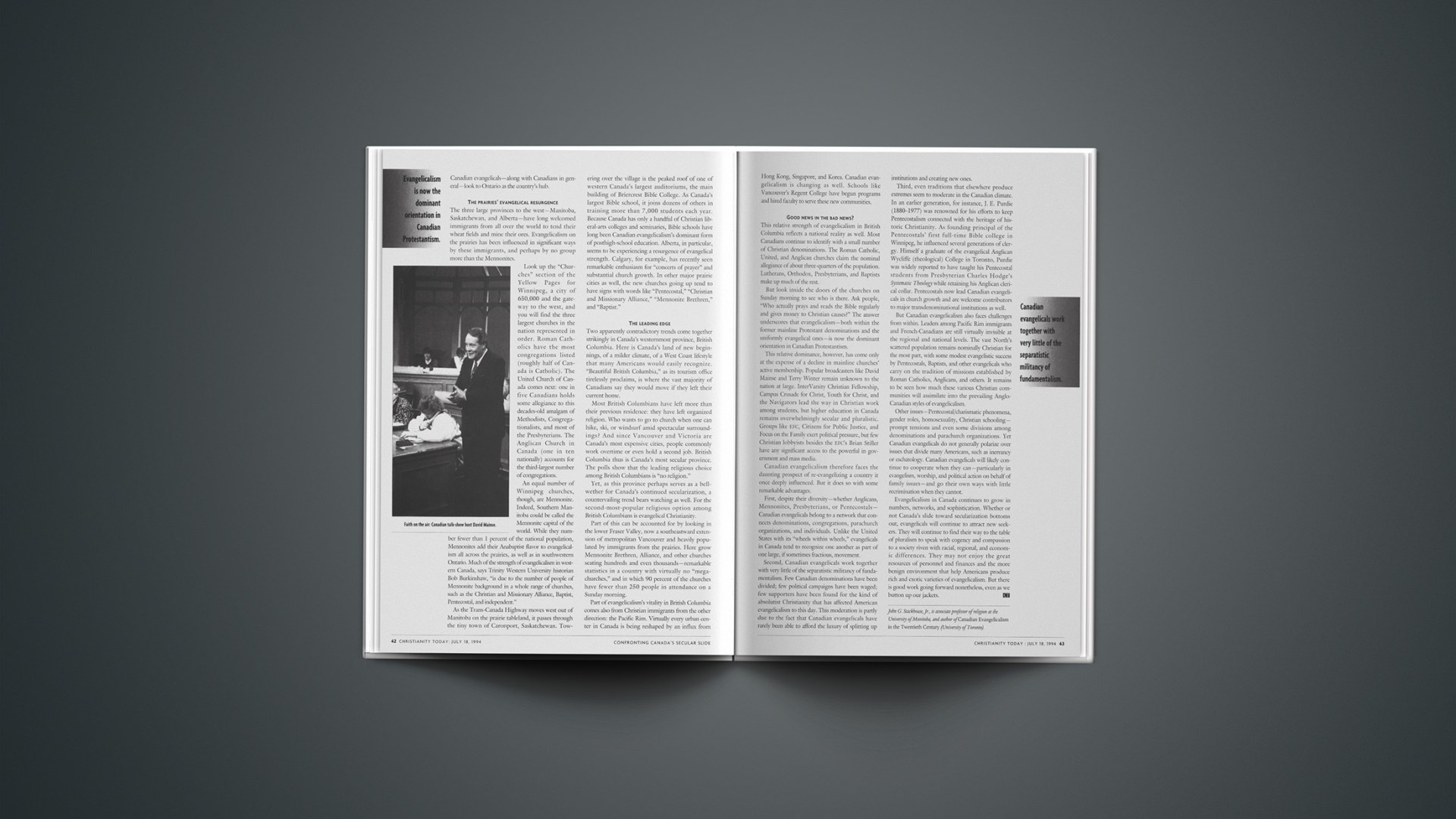He looks like a boxer. He enjoys performing on the piano. He likes to talk about his early years when he played hockey in northern Saskatchewan against scrappy Mennonite farm teams. Gifted with an eloquent tongue appropriate to someone from a Pentecostal home, he talks easily with politicians, form a pulpit, in small gatherings, or on national radio or TV.
Brian Stiller, executive director of the Evangelical Fellowship of Canada (EFC), Canada’s counterpart to the National Association of Evangelicals, has become one of Canada’s best-known evangelical spokespersons.
When Brian became executive director of EFC in 1983, he joined a moribund organization that had limped along for more than two decades. It had only part-time staff and a budget of $24,000 (Canadian). Today it has a budget of $2.6 million and a staff of more than 20. Then, though it sought to bring evangelicals together, it got little attention from most denominations and had virtually no public voice.
Now, a decade later, the evangelical convergence has left a mark on the entire country.
Under Stiller’s leadership, EFC has gained the support of 27 Canadian evangelical bodies-70 to 80 percent of the total-and now includes 110 agencies, institutions, and missions within its membership. It helps motivate and empower evangelicals in what they do best-evangelism-while giving them a means to address issues that affect all Canadians, whether abortion, doctor-assisted suicide, pornography, homosexuality, education, the Constitution, or national unity.
When he left the leadership of Canadian Youth for Christ, Stiller says, he was uncertain about his future. During a retreat to rethink his direction, he read Nehemiah and became preoccupied with the words “Find a broken wall.” The former president of EFC, fellow Pentecostal Harry Faught, told Stiller that a pastorate would be “absolutely wrong” for him; he should take on the leadership of EFC. Others encouraged him. Yet he felt little enthusiasm at first, Stiller says. But he recalls standing in a building his father had built, remembering words he often used: “Whatever your hands find to do, do with all your might.” It became his motto.
Stiller and Canadian evangelicals met at a “propitious moment,” says Ontario Theological Seminary dean Ian Rennie. Evangelicals at that time were open to a new direction. Wilfrid Laurier University professor John Redekop, a former president of EFC, says Stiller is “an entrepreneur-he likes to launch things and build a community.” And so he has. Under his leadership, EFC has launched a strong national news magazine (Faith Today) and organized a number of conferences and task forces. He has intervened in important legal hearings, spoken to government leaders numerous times, and provided strong backing to Canada’s Vision 2000 evangelism thrust.
One of several gifted sons of a Swedish Pentecostal pastor’s home, Brian grew up in Saskatoon, Saskatchewan, took Bible courses in the nearby Central Pentecostal College and at 26 was ordained by Pentecostal Assemblies of Canada. He did further study at the University of Toronto and Wycliffe College, an evangelical Anglican school in Toronto.
He spent 16 years working for Youth for Christ in Canada, the last 8 as its national director. That is where he got a sense of the country, the diversity of its evangelical groups, the incredible challenge of its geography, and the need for ways of working together.
Stiller believes fervently that Canadian evangelicals have much to contribute to national life, that they must speak to the culture, act with loving service, and proclaim Christ in explicit evangelism. This also means for Stiller a vision of the church that goes beyond narrow denominationalism. He rails against fragmented evangelicalism and expresses a longing for a spirit of forgiveness that seeks relationship to others in “the authentic spirit of Christ.”
At 52, Stiller writes and speaks and networks wildly. He shows few signs of slowing down. Many believe God will continue to use him as point person for Canadian evangelicals in a remarkable way.
Copyright © 1994 Christianity Today. Click for reprint information.










